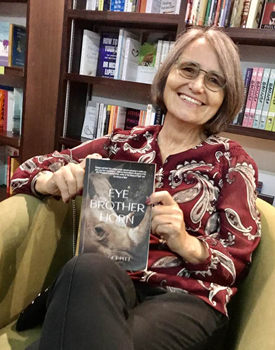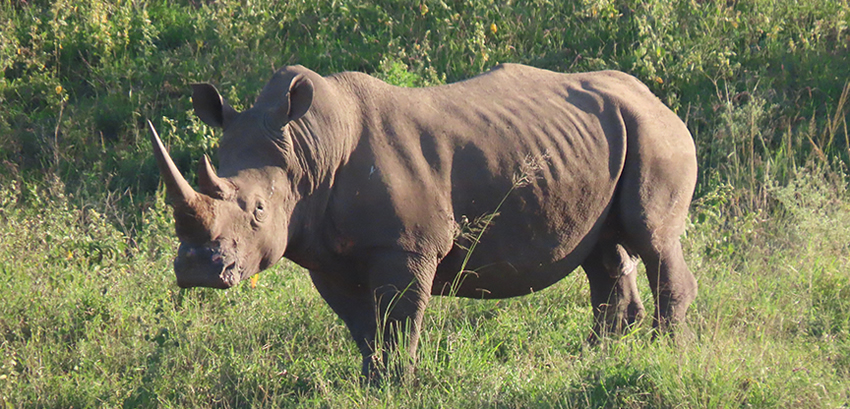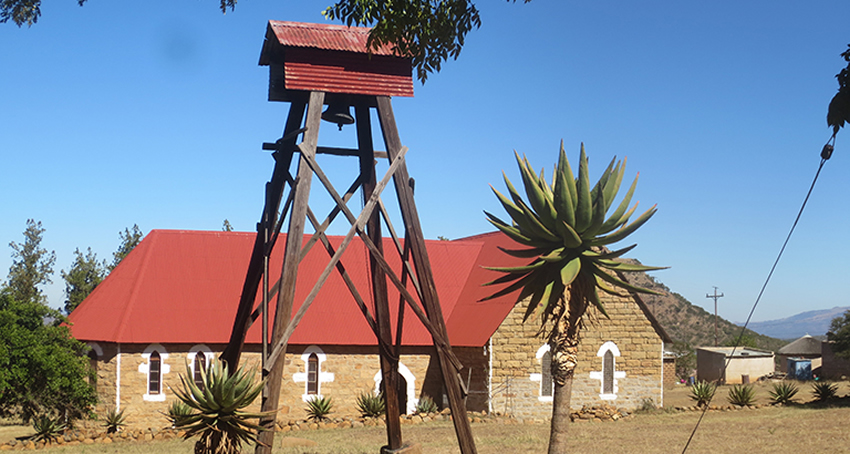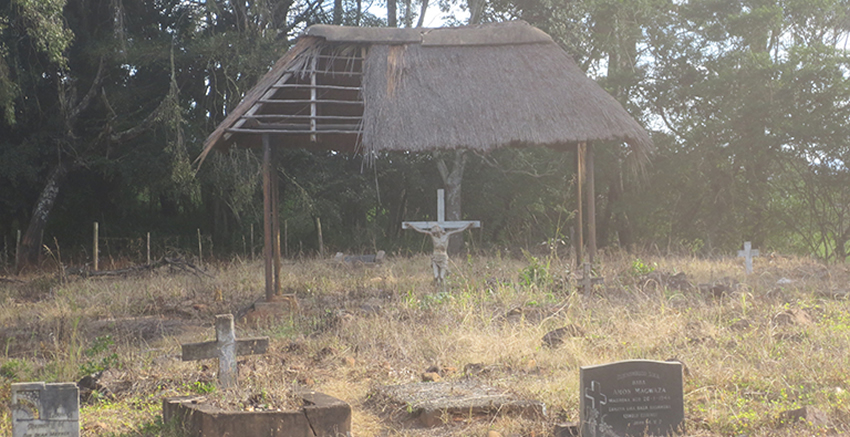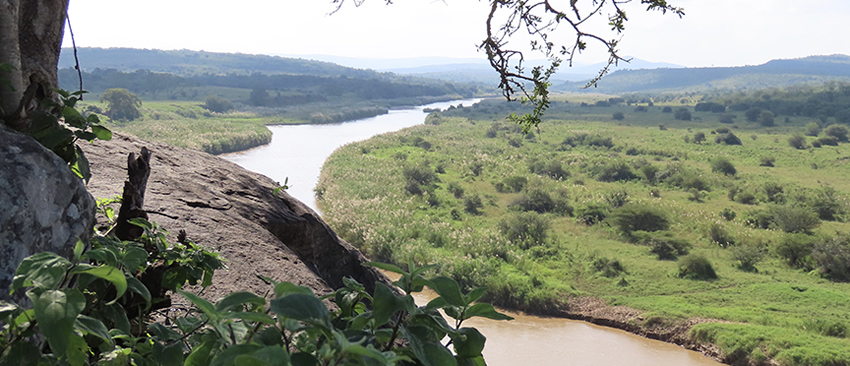

International International Thrills: Bridget Pitt
Africa Scene: Colonialism, Christianity, and Kinship in Zululand
Bridget Pitt is a South African writer and environmental activist. Her previous crime novel, The Unseen Leopard, was short-listed for the Commonwealth Writers’ Prize and other awards. In her new novel EYE BROTHER HORN, set in 1870s Natal, a Zulu foundling and a white missionary’s child are raised as brothers in a world intent on making them enemies. As tensions between them mount, they lead to anger and, eventually, to violent death. EYE BROTHER HORN is a gripping and moving historical novel that addresses identity and kinship against a clash of cultures.
In this interview for The Big Thrill, we asked Bridget how she came to write EYE BROTHER HORN, the depths of her research, and what’s next.
EYE BROTHER HORN follows the lives of two brothers in Natal in South Africa around 1870. One, Daniel, is the son of a white missionary, and the other is a Black foundling, about the same age as Daniel, whom his parents adopt and name Moses. The backstory is the devastation of the area by the British colonists who not only grab the land, clear it for sugarcane, and press the local people into working for them, but also destroy the wildlife of the area partly for profit but also just for fun.
What persuaded you to write a historical novel set in that location at that time?
I first started exploring the area about ten years ago with an interest in writing a novel on rhino poaching, which was rapidly escalating. The more I looked into it, the more I realized that the genesis of the rhino poaching crisis (and of most contemporary ecological and socio-economic crises) lay in the colonial era.
Colonialism in South Africa (first Dutch, then British) took place over three centuries, but the process in Natal and Zululand happened rapidly. A small group of English pioneers arrived in 1824. Initially, they relied heavily on the patronage of the Zulu kings—first Shaka, then Dingane followed by Mpande. The British annexed the coastal area from the Boers in 1843—this was tolerated by the Zulu monarchy as the British provided a bulwark against the Boers, who were encroaching from the western interior. There were also a number of tribal groups who had been driven south of the Thukela River, and the British helped to subdue these.
This balance of forces shifted very rapidly between 1850 and 1879 (the period covered by the novel). The British imposed increasing laws on taxes on the tribes south of the Thukela, arrested tribal leaders who did not conform, and in 1979 British troops invaded Zululand. After months of intense battles, with heavy casualties on both sides, the British defeated the Zulu impi and gutted the power of the Zulu kingdom and rulers.
This rapid shift highlighted the destructive impact of colonialism on the indigenous communities. It also highlighted the devastating impact of colonialism on the natural landscape, on the wild plants and animals, and on the relationship between the indigenous people and the natural world. Old growth trees in forests were felled to build ships and homes; coastal forests and grasslands were cleared for sugar cane; herds of antelope and buffalo were displaced or killed for their pelts and sport, and rhinos and elephants were driven to local extinction all within 30 years. The scale on which wild animals were killed was staggering.
Personal diaries and accounts also revealed a rapid shift in attitude amongst the British settlers. While many came with some sympathy for the indigenous inhabitants, within a few years this hardened to extreme racism in order to justify the theft of land, forced labor, and impoverishment of the local people.
For these reasons, I felt that this was an ideal geographical location and historical period to explore some of the social, psychological, and ecological legacy of colonialism.
How did you go about researching the local culture and the historical backstory of Natal 150 years ago?
I felt that this was an ideal geographical location and historical period to explore some of the social, psychological, and ecological legacy of colonialism.I began with historical accounts and analyses, but I also immersed myself in as many diaries, letters, and personal accounts as I could find. I wanted to get a sense of how people were experiencing this rapidly shifting landscape in their day-to-day lives. I was also curious to understand how the British settlers and missionaries saw themselves, and how they understood their role in the colonial enterprise. It was harder to research the subjective experience of the indigenous people, as there are few written records, and much of what there is was translated or transcribed by the missionaries and settlers. Much as some were resolved to represent indigenous viewpoints accurately, there was inevitably some bias or weakness in translation which would have distorted their accounts.
I also spoke to a number of local Zulu people, who helped me understand some of the cultural and philosophical outlooks, and who recalled what they had been told about the history by parents and grandparents. And I drew on anthropological studies.
As a boy, Moses seems willing to fit into the English culture of his adoptive parents, but as he grows older, he realizes he will never be accepted by the colonists because of the color of his skin. He is largely rejected by his own people also. He is left with a passion for science and mathematics, and he longs to study those subjects with experts in England if he can find the funds. Is this his way of escaping the contradictions of Natal?
Like many children with uncertain beginnings, Moses is seeking truth. He knows that he has been lied to about his origins, and, as he grows older, he starts to question much of the religious doctrine which has been presented to him as the ‘gospel truth.’ He is acutely aware of the constraints imposed on him by his father’s wish for him to become a missionary. When he encounters other white members of colonial society, he is made aware of the constraints imposed by their prejudices.
His upbringing has alienated him from his birth culture, and he feels isolated and estranged, accepted by neither the English nor the Zulu. England represents for him a place where he can discover his identity and “be himself”; where he can pursue the search for truth and knowledge through science, which he trusts more as an instrument for understanding the world than religion. The irony is that 19th-century England was hardly a place where anyone, let alone a Black man could “be himself.” Moses suspects that this may be the case, but clings to the hope that it will offer him broader horizons as life becomes more and more intolerable for him in the colony.
The Reverend Whitaker comes across as a good man, but naïve. Although he is called “the teacher” by the locals, they give little credence to his preaching. Whitaker hopes that Moses will be the bridge to his people in the future, but Moses has no real interest in that role. Whitaker’s wife, Kazi, is more realistic about their situation, and she holds the family together as long as possible. Would you comment?
Reverend Whitaker typifies the attitude of many of the missionaries whose diaries I read. Like them, he came with a zealous and, yes, naïve conviction that the people he would be trying to convert would be only too delighted to embrace Christianity. When the missionaries encountered the reality of a people with their own well-established belief systems and embedded cultural and social practices, they tended to either question aspects of Christian doctrine, or to become more rigid and willing to support the colonial erosion of the governance and social structure of the Zulu.
Reverend Whitaker took the latter course, and became increasingly hardened in his attitudes, ultimately believing that destroying the Zulu monarchy was the only way to establish Christianity. Moses loses any appetite for becoming a missionary himself, as he realizes that the actions of the missionaries are part of the greater colonial effort to subjugate and dispossess the local people. Kazi finds herself in an impossible position. She can see the contradictions of their missionary work and understands Moses’ reservations. She has an inquiring mind herself and is keen to stimulate Moses’ intellectual inquiry. As a woman, her own intellectual development has been stifled, and she can relate to Moses’ frustration. But she knows that the more she broadens Moses’ horizons, the more he will be driven from the church.
Much is at stake, as creating a missionary in Moses would help to convince the church authorities that the mission station is successful, and should be supported (after twenty years, there is little else to show for it). Kazi is all too aware that the support of the mission station by the colonial and church authorities depends on it upholding colonial values.
Daniel and Moses are really only comfortable with each other, although even this bond is stretched on occasion. When they get older, a wedge is deliberately driven between them by their wealthy uncle Sir Roland, the hoped-for benefactor, who encapsulates all the worst features of the colonialists. He ensures that the young men are separated and that Moses “knows his place.” Is Sir Roland’s main purpose in the story to pressure the brothers to breaking point?
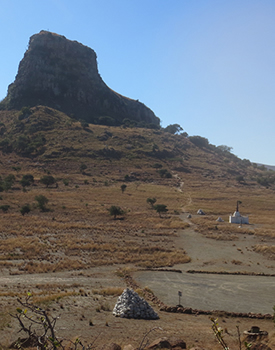
Isandlwana Battlefield: Cairns of white stones mark where the bones of Zulu and British soldiers were found.
I wrote Sir Roland as an ambiguous character. Is he just a nasty person who wants to destroy Moses, or does he genuinely believe that Moses has been confused by being raised as a member of a white family, and will be best served by moderating his expectations so that he can better fit into colonial society? Whatever his motives, he is at first uncomprehending and then threatened by the bond that the two brothers share. The boys were able to become so close to each other because they spent their childhood on a remote mission station relatively removed from the realities of the colonial regime—although it was inevitable that this way of being could not last forever, and whatever happened, the boys would have been tested in adulthood.
Sir Roland’s main purpose in the story is to represent some of the harsh realities of the colonial project, to manifest the hardened attitudes of most colonial agents, and to illustrate the social pressure to conform placed on both Black and white inhabitants by the times. His attitudes are not particularly extreme in the context of the time—most of the diaries/accounts I read revealed similar attitudes amongst the colonial authorities and settlers.
Daniel has a close escape from a rhino as a baby, and this seems to create a physical bond for him, not only with rhinos but also with all the wildlife being indiscriminately slaughtered. This has the dual effect of causing him physical pain and also of losing face with Sir Roland, who is an avid hunter. It leads to his total alienation from Sir Roland. Why did you choose an encounter with a rhino as the pivot for the story?
As I said earlier, I came to this story through an interest in rhino poaching, so I was already oriented toward them, but they also seemed to best fit the needs of the story. Elephants might have been a more obvious choice—they are more relatable, they have social structures and a keen intelligence that we can recognize. Rhinos are perhaps more opaque, great megafauna which seem to hail from the dinosaur age, fairly solitary, powerful, and yet rendered so vulnerable—now and in the colonial era—by the horns on their nose. Since the novel explores bonds of connection that defy social convention, I liked the idea of Daniel’s kinship with a creature that is so otherworldly.
This encounter, which Daniel recalls with both fear and wonder, creates a fault line in Daniel’s psyche that enables him to connect with other species and also to connect more profoundly with his brother—even when that connection threatens his sanity as he buckles under Sir Roland’s toxic masculinity and domineering efforts to ‘make a man’ of him.
You have broad writing interests—fiction, non-fiction, and poetry. What are your current projects?
I have an ongoing interest in writing about environmental issues, in particular exploring how the prevailing belief and value systems have driven the cascading social and environmental crises that we are facing. On the fiction side, I am working on a collaborative novel with another author exploring the conflict between communities and the coal-mining operations in rural KwaZulu Natal.
To learn more about Bridget Pitt, head to: www.BridgetPitt.com or follow her on social media @bridget_pitt or Facebook at Bridget.Pitt.author.
- International Thrills: Fiona Snyckers - April 25, 2024
- International Thrills: Femi Kayode - March 29, 2024
- International Thrills: Shubnum Khan - February 22, 2024


